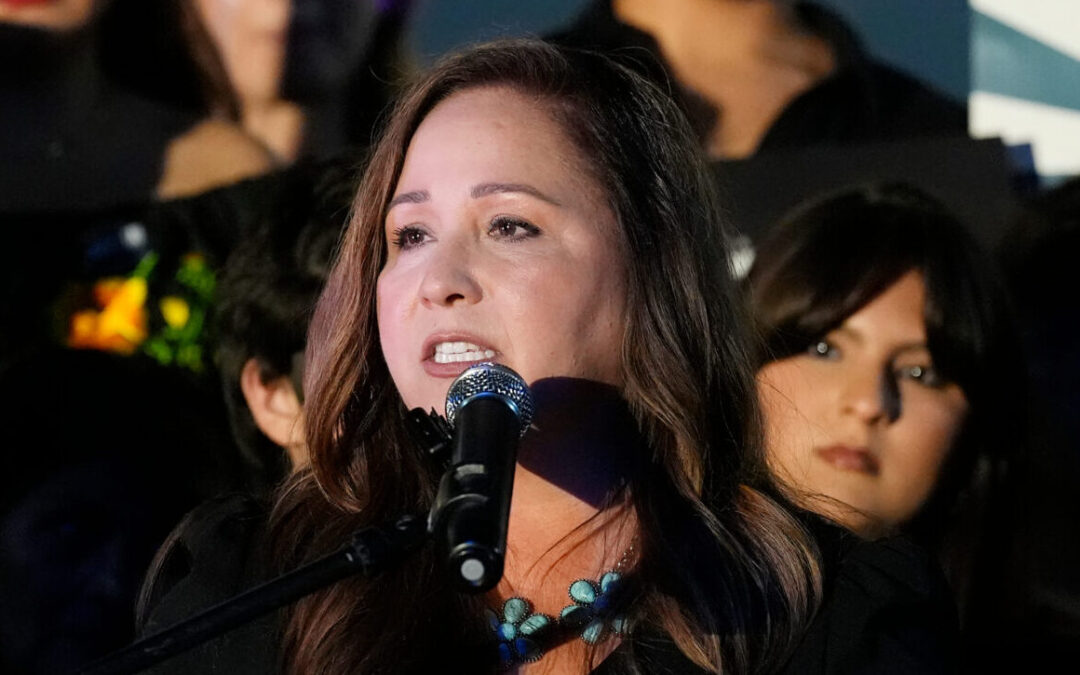
by Matthew Holloway | Oct 12, 2025 | News
By Matthew Holloway |
In a video rant on Thursday, Senator Ruben Gallego (D-AZ) claimed he had to ‘restrain’ himself during a hallway clash with House Speaker Mike Johnson over the government shutdown and swearing-in of Democrat Rep.-elect Adelita Grijalva.
The exchange, captured on video and shared by Gallego’s office, happened on Wednesday outside Johnson’s office at the Capitol. Both of Arizona’s Democrat Senators, Gallego and Mark Kelly, pressed Johnson on his refusal to swear in Grijalva, a Democrat and the daughter of the late Rep. Raúl Grijalva, in a pro forma session.
Grijalva’s seating would provide the 218th signature needed for a discharge petition to force a House vote on releasing Jeffrey Epstein’s client list, they contend. However, Speaker Johnson has described the controversy as a “red herring” and a “distraction.” Grijalva’s special election win in Arizona’s 3rd Congressional District is also still pending certification in a statewide canvas scheduled for Oct. 14th.
Gallego, a Marine veteran, described the moment in his post on X, claiming that he folded his arms in a posture he described as a Marine technique for de-escalation, to avoid escalating the situation. “I had to restrain myself from doing more,” Gallego wrote, accusing Johnson of “holding Adelita Grijalva hostage” to block the Epstein vote. In the video, Gallego can be heard telling Johnson to “get your people in and stop covering up for the pedophiles,” referring to the Epstein files.
Kelly, standing beside Gallego, called the delay “ridiculous” and urged Johnson to “swear her in,” emphasizing Grijalva’s victory in the heavily Democratic district. The confrontation lasted less than two minutes and was filmed by reporters who had gathered for a planned press gaggle outside the Speaker’s office. Contrary to Gallego’s claims, U.S. Marine Corps manuals and law enforcement de-escalation guidelines from the Cybersecurity & Infrastructure Security Agency, as cited by the Daily Caller, do not prescribe the crossing of arms as a de-escalation technique. Rather, the outlet noted body language experts interpret the gesture as defensive or closed-off, and suggest positions with hands, open and visible.
Johnson, appearing on CNN’s The Lead with Jake Tapper, described the encounter as a “failed publicity stunt” by the Democrats. He disputed Gallego’s account of his body language, saying the senator appeared “very uncomfortable” and was “not telling you the truth.” Johnson reiterated that the House is not in session due to the Democratic walkout and pointed to the Democrats’ demanding concessions like $200 billion in benefits for non-citizens.
In his ranting video reaction to the Jake Tapper appearance, Gallego claimed, “He’s such a f***ing liar. And what a creep. He’s just telling what I’m thinking. I literally told him what I’m thinking. He is absolutely holding Adelita Grijalva hostage so that way she can’t be the 218th vote on the discharge petition. That’s it. It’s just that simple,” Gallego said.
“His reasons keep on changing. I think he gets away with the press because they don’t actually push him on it, but I did yesterday, and he should be happy I had my arms folded. There’s a reason why Marines fold their arms. It’s because it’s a way to make sure that we restrain ourselves,” Gallego said.
Speaker Johnson’s Rapid Response team offered a blistering response in a post to X, writing, “Instead of voting to OPEN the Government, Gallego instead has time to: Stage a FAILED publicity stunt, FAIL to fundraise off it, Record this SECOND rate video, Seemingly threaten the Speaker?! Democrats hide behind expletives because they have NO message.”
The partial government shutdown began Sept. 30 after Congress failed to pass a continuing resolution to fund federal operations. It has furloughed thousands of federal workers and closed some national parks. Republicans, led by Johnson, seek to strip funding for programs they view as wasteful, including subsidies for Planned Parenthood and specific green energy initiatives. Democrats, including Senate Majority Leader Chuck Schumer, have pushed for a “clean” bill without those cuts, accusing Republicans of using the shutdown as leverage.
Matthew Holloway is a senior reporter for AZ Free News. Follow him on X for his latest stories, or email tips to Matthew@azfreenews.com.

by Ethan Faverino | Oct 12, 2025 | News
By Ethan Faverino |
In a recent opinion piece in Townhall, Congressman Abraham Hamadeh (R-AZ-08) declared that he is leading the charge to end federal funding for transgender experiments on animals,” signaling a bold stance against the misuse of taxpayer dollars.
Congressman Hamadeh announced he is directing a group of House Republicans to demand that Fiscal Year 2026 spending bills include explicit language prohibiting federal funding for transgender experiments on animals.
“When Americans send their hard-earned money to Washington, they expect it to be used wisely to secure our borders, to defend our nation, and to provide essential services that protect our citizens. What they do not expect is for their tax dollars to bankroll the latest ideological fads of the radical left,” said Hamadeh.
“No one should be forced to subsidize radical gender ideology, let alone grotesque experiments that inflict suffering on animals in the name of ‘gender transition science.’ This is not medical research; it’s political theater disguised as science,” he added.
The initiative addresses growing concerns over federal funding being used to support immoral and unnecessary experiments involving animals such as monkeys, mice, and rabbits.
These experiments reportedly involve mutilating animals and administering cross-sex hormones to advance theories aligned with radical gender ideology.
“What possible scientific benefit can come from mutilating a rabbit or drugging a monkey with cross-sex hormones? None,” stated Congressman Hamadeh. “These experiments are not about medical advancement; they are about normalizing the transgender agenda.”
Hamadeh’s call to action highlights a broader issue: the capture of America’s research institutions by ideology. Agencies like the National Institute of Health (NIH) have diverted taxpayer dollars to projects that prioritize cultural agendas over scientific integrity.
The Congressman pointed to the Biden administration’s aggressive promotion of gender ideology across education, healthcare, and federal research as a driving force behind these experiments. “Billions of taxpayer dollars have been funneled into projects that redefine biology, undermine parental rights, and confuse children,” he said.
The push to defund these experiments is framed as part of a larger fight to protect American values and restore common sense to government spending.
Hamadeh concluded with a message to all members of Congress, saying, “The American people deserve better. Our children deserve better. And the animals who have no voice at all deserve better. That’s why I will keep leading this charge, because the line must be drawn here, and it must be drawn now. This isn’t politics – it’s common sense.”
Ethan Faverino is a reporter for AZ Free News. You can send him news tips using this link.

by Jonathan Eberle | Oct 12, 2025 | News
By Jonathan Eberle |
A traffic stop in Arizona turned into a full arrest after what began as a speeding violation escalated into multiple criminal charges — and a surprising 911 call from the driver.
According to law enforcement sources, a deputy pulled over a vehicle for criminal speed (excessive speeding) earlier this month. During the stop, the driver allegedly placed a 911 call to report that his vehicle was being towed by the deputy.
When deputies pressed for identification and documentation, the driver was unable to produce a valid driver’s license or any legal identification. Further investigation revealed that he had outstanding warrants. Authorities also determined the individual had given false information to the deputy.
Because of the outstanding warrants and the suspected immigration status, the driver was arrested on multiple charges:
- Speeding (criminal speed)
- Providing false information to law enforcement
- Driving without a license or identification
- Violating active warrants
The deputy involved reported that once the driver realized the vehicle would be towed, he dialed 911, perhaps in an attempt to prevent the impound. The driver’s quote—“What happen you bro? I no speed my friend”—suggests he denied speeding and attempted to argue during the stop.
The video shows the deputy stating the driver has been in the country illegally “at least” since 2011, and it is likely that immigration enforcement agencies will be involved depending on the outcome of the local criminal process. In many jurisdictions, collaboration exists between law enforcement and federal immigration authorities, though policies vary by county and state.
What began as a routine traffic stop quickly turned into a broader criminal arrest after attempts to conceal identity and existing warrants came to light. As the case proceeds through the legal system, more details may emerge, including the driver’s identity, the exact charges filed, and whether immigration enforcement agencies will become involved.
Jonathan Eberle is a reporter for AZ Free News. You can send him news tips using this link.

by Matthew Holloway | Oct 11, 2025 | News
By Matthew Holloway |
Former Arizona Governor Doug Ducey sharply rebuked Gov. Katie Hobbs’ announcement of her 2026 reelection campaign, accusing her of fiscal mismanagement that turned a $2.5 billion surplus into a $1.4 billion deficit.
Hobbs launched her bid for a second term on Wednesday in a two-minute video posted to X, where she emphasized her administration’s focus on education, public safety, and housing affordability.
“Arizona is a place of hard work, hope and determination,” Hobbs said. “That’s why I’m running for reelection — to continue putting your family first.”
Ducey, a Republican who preceded Hobbs in office, responded hours later on X, quoting Hobbs’ video and writing: “This dishonesty isn’t surprising given the current struggles on the 9th floor. When I left office, I turned over a $2.5B SURPLUS to Katie Hobbs. She blew it all AND created that $1.4B deficit in only a year. AZ didn’t have a revenue problem, Hobbs had a spending problem.”
The exchange between the former and current governors highlights Arizona’s ongoing budget tensions. Hobbs inherited the surplus from Ducey in January 2023, but the state faced a projected $1.4 billion shortfall for fiscal year 2025. According to a report from the Common Sense Institute of Arizona (CSI), that shortfall was mainly driven by increased spending and not the state’s adoption of a flat income tax rate of 2.5% or the Empowerment Scholarship Account (ESA) program.
The GOP-led Arizona legislature approved a $16.1 billion budget in June 2024, following a major budget battle that addressed the deficit by incorporating spending cuts and one-time adjustments. Hobbs signed the measure, though Republican critics, including House Speaker Ben Toma, have described her fiscal approach as unsustainable.
Reactions to Ducey’s post were polarized. A few users defended Hobbs, claiming Ducey’s tax cuts and ESA expansions as root causes of the shortfall. Others echoed his criticisms. A few, urged Ducey to support GOP challengers in the 2026 gubernatorial race, like U.S. Rep. Andy Biggs. The vast majority offered critiques of the former Governor.
Matthew Holloway is a senior reporter for AZ Free News. Follow him on X for his latest stories, or email tips to Matthew@azfreenews.com.

by Staff Reporter | Oct 11, 2025 | News
By Staff Reporter |
Representative-elect Adelita Grijalva says her district deserves representation, though she was silent on the absence of her father, the late Raúl Grijalva, from office.
The younger Grijalva has yet to be sworn in. She says Republicans are to blame for their refusal to agree to Democrats’ desired Obamacare continuations to lift the ongoing government shutdown.
“Speaker Johnson continues to make excuses but all the while southern Arizona still does not have a voice in Washington,” said Grijlava.
Senator Ruben Gallego also blamed House Speaker Mike Johnson and the rest of his Republican colleagues for Grijalva not being sworn in, claiming Johnson was telling “lies” to the public.
Contrary to Grijalva’s characterization of the situation, Grijalva can’t be sworn in because the statewide certification has yet to take place.
Grijalva’s desire to secure representation for her district is also a newfound one. She had little to say during the final years of her father’s term.
The late Grijalva missed most votes from last year and this year amid a lung cancer battle that would ultimately claim his life in March at 77 years old. The longtime Democrat had held his seat for 20 years when he announced his lung cancer diagnosis in 2023.
The late Grijalva missed nearly all votes (about 97 percent of votes) this and the last session before his passing. The only vote he took this session was for Democratic Rep. Hakeem Jeffries for House Speaker at the start of session. He defended his absence with the claim his vote wouldn’t have any impact in a Republican-controlled Congress.
“They’re inconsequential because the Republicans are in charge and it’s the worst performing Congress in decades, if not a hundred years,” said Grijalva at the time.
Tucson residents were quick to point out the successor Grijalva’s hypocrisy.
“A lung cancer diagnosis in April 2024 led Grijalva to miss most of his votes in the House of Representatives throughout the year and into 2025,” said one user. “[You] didn’t say a damn word.”
Grijalva couldn’t be sworn in sooner than next Tuesday, anyways, because that’s when the statewide canvass is scheduled.
Arizona Secretary of State and fellow Democrat Adrian Fontes issued a press release on that point. The deadline to file an election contest, also, will not occur until October 20.
Next Tuesday is also the earliest date the Senate will reconvene to possibly agree on a continuing resolution to cease the government shutdown.
Debbie Lesko, Maricopa County Supervisor and former congresswoman, reminded the public that she wasn’t sworn in until the House began its session that year, in 2018.
“[This is] what’s happening with Grijalva,” said Lesko. “The Democrats and media are making a big deal over nothing.”
Congress had its longest shutdown on record from December 2018 to January 2019. The shutdown has lasted for over a week now.
AZ Free News is your #1 source for Arizona news and politics. You can send us news tips using this link.

by Jonathan Eberle | Oct 11, 2025 | Economy, News
By Jonathan Eberle |
Arizona State Senator David Farnsworth, chairman of the Senate Appropriations and Transportation Committee, is doubling down on his commitment to improving Arizona’s transportation network, emphasizing both immediate roadway repairs and longer-term investments in next-generation infrastructure.
Farnsworth noted that Arizona’s rapid population growth is putting added strain on highways and local roads, making safety and upkeep a pressing priority. His plan, he said, reflects a blend of conservative fiscal principles and forward-looking technology, designed to strengthen connectivity across the state while preparing for future mobility needs.
A central component of that vision is Advanced Air Mobility (AAM) — a developing technology that uses electric aircraft, sometimes called “air taxis,” capable of vertical takeoff and landing for short-distance travel. Advocates say AAM could ease traffic congestion, expand emergency response capabilities, and connect rural communities more effectively. Farnsworth has supported legislative work on AAM since 2024, with an eye toward balancing innovation with public safety and regulatory clarity.
Other states are already moving toward implementation. For example, Archer Aviation is slated to provide official air taxi services for the 2028 Olympic Games in Los Angeles. Farnsworth said Arizona must be proactive in keeping pace with such developments.
The senator also pointed to autonomous vehicle testing in Arizona, particularly self-driving ground taxis, as a model for how advanced technology can be integrated into daily life. Together with AAM, he said, these tools represent the next chapter of transportation policy.
“The work begins by repairing what is broken, followed by building what comes next,” Farnsworth said. “Advanced Air Mobility and autonomous vehicles are no longer concepts of the future—they are active technologies with real-world applications. My job is to ensure Arizona stays ahead of the curve, not behind it.”
Farnsworth stressed that his focus remains on practical investments and collaboration with communities, technology leaders, and policymakers. His goal, he said, is a transportation system that is modernized, fiscally responsible, and designed to serve Arizona residents well into the future.
Jonathan Eberle is a reporter for AZ Free News. You can send him news tips using this link.






